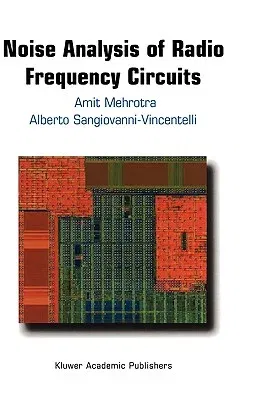In high speed communications and signal processing applications, random
electrical noise that emanates from devices has a direct impact on
critical high level specifications, for instance, system bit error rate
or signal to noise ratio. Hence, predicting noise in RF systems at the
design stage is extremely important. Additionally, with the growing
complexity of modern RF systems, a flat transistor-level noise analysis
for the entire system is becoming increasingly difficult. Hence accurate
modelling at the component level and behavioural level simulation
techniques are also becoming increasingly important. In this book, we
concentrate on developing noise simulation techniques for RF circuits.
The difference between our approach of performing noise analysis for RF
circuits and the traditional techniques is that we first concentrate on
the noise analysis for oscillators instead of non-oscillatory circuits.
As a first step, we develop a new quantitative description of the
dynamics of stable nonlinear oscillators in presence of deterministic
perturbations. Unlike previous such attempts, this description is not
limited to two-dimensional system of equations and does not make any
assumptions about the type of nonlinearity. By considering stochastic
perturbations in a stochastic differential calculus setting, we obtain a
correct mathematical characterization of the noisy oscillator output. We
present efficient numerical techniques both in time domain and in
frequency domain for computing the phase noise of oscillators. This
approach also determines the relative contribution of the device noise
sources to phase noise, which is very useful for oscillator design.
This new way of characterizing the oscillator output has a far-reaching
impact on the noise analysis methodology for nonautonomous circuits,
which we also investigate. We also use the perturbation analysis results
of oscillators to derive the phase noise of phase feedback systems such
as phase-locked loops. We formulate the problem as a stochastic
differential equation and is solved in presence of circuit white noise
sources yielding the spectrum of the PLI output.
Noise Analysis of Radio Frequency Circuits is written for circuit
designers and will be of particular interest to RF circuit designers.

